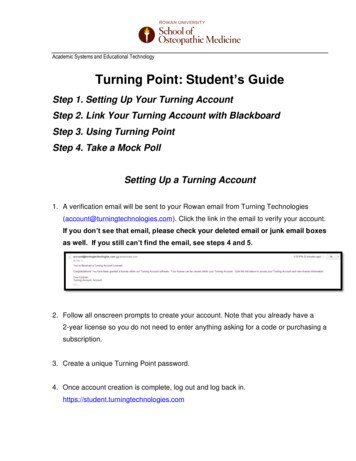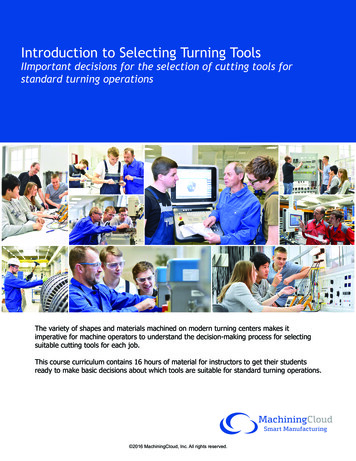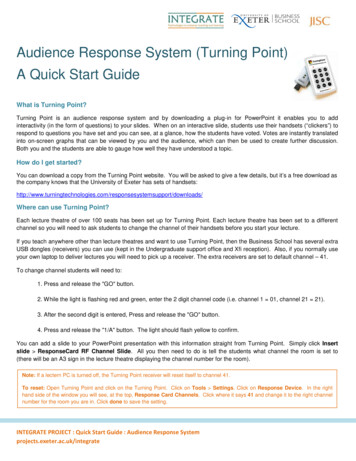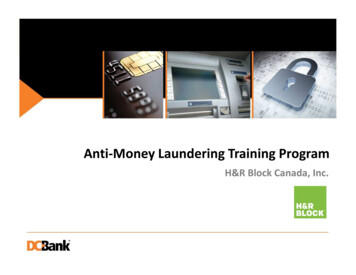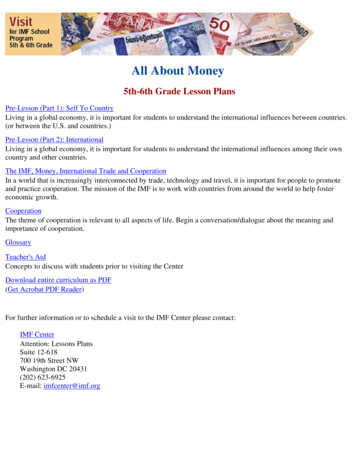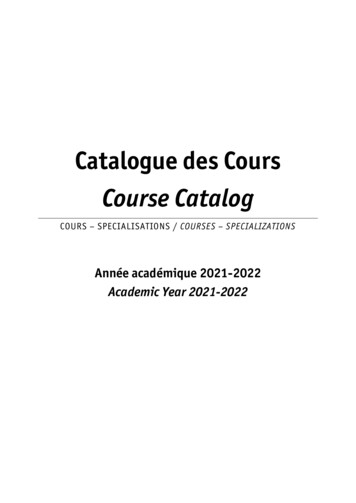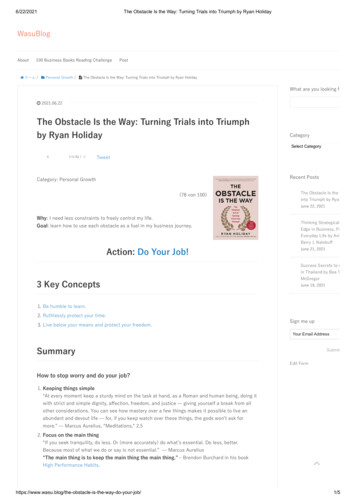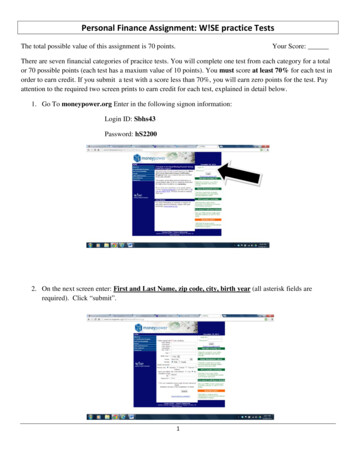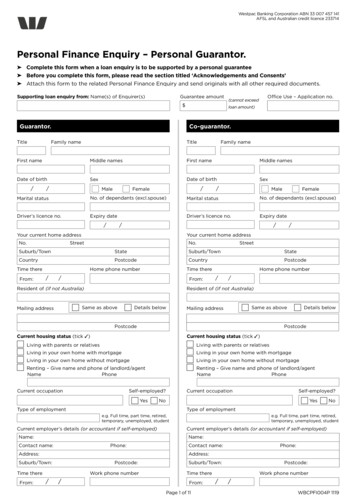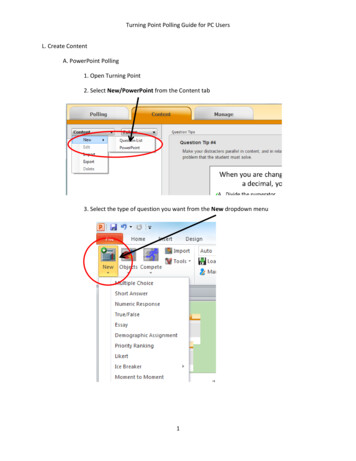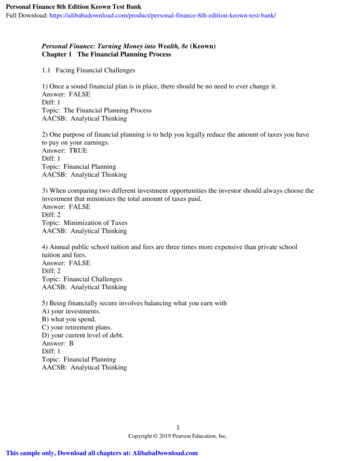
Transcription
Personal Finance 8th Edition Keown Test BankFull Download: ce-8th-edition-keown-test-bank/Personal Finance: Turning Money into Wealth, 8e (Keown)Chapter 1 The Financial Planning Process1.1 Facing Financial Challenges1) Once a sound financial plan is in place, there should be no need to ever change it.Answer: FALSEDiff: 1Topic: The Financial Planning ProcessAACSB: Analytical Thinking2) One purpose of financial planning is to help you legally reduce the amount of taxes you haveto pay on your earnings.Answer: TRUEDiff: 1Topic: Financial PlanningAACSB: Analytical Thinking3) When comparing two different investment opportunities the investor should always choose theinvestment that minimizes the total amount of taxes paid.Answer: FALSEDiff: 2Topic: Minimization of TaxesAACSB: Analytical Thinking4) Annual public school tuition and fees are three times more expensive than private schooltuition and fees.Answer: FALSEDiff: 2Topic: Financial ChallengesAACSB: Analytical Thinking5) Being financially secure involves balancing what you earn withA) your investments.B) what you spend.C) your retirement plans.D) your current level of debt.Answer: BDiff: 1Topic: Financial PlanningAACSB: Analytical Thinking1Copyright 2019 Pearson Education, Inc.This sample only, Download all chapters at: AlibabaDownload.com
6) Financial planning might not help you earn more, but it can help you use the money you doearn to achieve yourA) life's purpose.B) dreams.C) financial goals.D) desired lifestyle.Answer: CDiff: 1Topic: Financial GoalsAACSB: Analytical Thinking7) Which statement is true about managing personal finances?A) The ability to manage finances is a skill with which you are born.B) Personal finance courses are commonly offered in high school.C) Financial difficulties can be a major cause of marital problems.D) Personal financial management is not a skill worth learning.Answer: CDiff: 2Topic: Finance CompanyAACSB: Analytical Thinking8) In order for your financial plan to be realistic and attainable it needs to be based upon yourA) budget.B) income level.C) number of tax deductions, exemption, exclusions, and credits.D) balance sheet.E) none of the above.Answer: BDiff: 2Topic: Financial PlanningAACSB: Analytical Thinking9) Personal financial planning can help you toA) deal with unplanned health issues.B) minimize your tax payments to Uncle Sam.C) minimize your chances of personal bankruptcy.D) have enough money for a comfortable retirement.E) all of the above.Answer: EDiff: 2Topic: Financial PlanningAACSB: Analytical Thinking2Copyright 2019 Pearson Education, Inc.
10) What elements are found in an effective financial plan?A) Flexibility to allow for changes in your situationB) Sufficient liquidity to meet unexpected needsC) Insurance protection from catastrophic eventsD) Helps you legally reduce the amount of taxes you oweE) All of the aboveAnswer: EDiff: 1Topic: Financial PlanningAACSB: Analytical Thinking11) This course/text will assist you in accomplishing six financial objectives. What are they?Answer:1. Manage the unplanned.2. Accumulate wealth for special expenses.3. Realistically save for retirement.4. Cover your assets.5. Invest intelligently.6. Minimize your payments to Uncle Sam.Diff: 2Topic: Financial PlanningAACSB: Analytical Thinking12) How will a financial plan help you save for retirement?Answer: A strong financial plan will help you forecast the costs of retirement and develop a planthat will allow you to live a comfortable life after you retire.Diff: 2Topic: Financial PlanningAACSB: Reflective Thinking1.2 The Personal Financial Planning Process1) Today, most Americans over the age of 65 have adequate savings and income available tothem during retirement.Answer: FALSEDiff: 1Topic: Financial Planning Life CycleAACSB: Analytical Thinking2) The amount of current income that you earn today isn't relevant to setting your long termgoals for the future.Answer: FALSEDiff: 1Topic: Financial PlanningAACSB: Reflective Thinking3Copyright 2019 Pearson Education, Inc.
3) A financial plan is only concerned with your future earnings and expenses. An examination ofyour current financial situation is not so important.Answer: FALSEDiff: 1Topic: The Financial Planning ProcessAACSB: Analytical Thinking4) While each person's financial plan is different, some common factors guide all sound financialplans: flexibility, liquidity, protection, and minimization of taxes.Answer: TRUEDiff: 2Topic: The Financial Planning ProcessAACSB: Analytical Thinking5) Financial planning is an ongoing process. As your financial situation and position in lifechange, the plan changes.Answer: TRUEDiff: 1Topic: The Financial Planning ProcessAACSB: Analytical Thinking6) Which of the following is one of the five basic steps in personal financial planning?A) Evaluate your personal health.B) Define your career goals.C) Develop a plan of action.D) Let an accountant review your plan.Answer: CDiff: 2Topic: The Financial Planning ProcessAACSB: Analytical Thinking7) Which basic step to personal financial planning should be considered when examining yourcurrent financial situation?A) Step 1B) Step 2C) Step 3D) Step 4Answer: ADiff: 1Topic: The Financial Planning ProcessAACSB: Analytical Thinking4Copyright 2019 Pearson Education, Inc.
8) Which basic step to personal financial planning should be considered when establishing yourpersonal financial goals?A) Step 1B) Step 2C) Step 3D) Step 4Answer: BDiff: 1Topic: The Financial Planning ProcessAACSB: Analytical Thinking9) The personal financial planning process consists of steps.A) threeB) fiveC) sevenD) tenAnswer: BDiff: 1Topic: The Financial Planning ProcessAACSB: Analytical Thinking10) While each person's financial plan is different, some common factors guide all soundfinancial plans. Which of the following is one of the common factors?A) SustainabilityB) IlliquidityC) ProtectionD) Maximization of taxesAnswer: CDiff: 2Topic: The Financial Planning ProcessAACSB: Analytical Thinking11) Evaluating your financial health consists ofA) preparing a personal balance sheet.B) determining what you are worth.C) preparing a personal income statement.D) determining where your money comes from and where it goes.E) all of the above.Answer: EDiff: 1Topic: The Financial Planning ProcessAACSB: Analytical Thinking5Copyright 2019 Pearson Education, Inc.
12) You need to review your progress and reevaluate and revise your plan (Step 5) becauseA) your financial needs change over the course of your life.B) your employment situation changes over time.C) your net worth changes over time.D) your family situation might change over time.E) all of the above are good reasons to periodically review your financial plan.Answer: EDiff: 3Topic: The Financial Planning ProcessAACSB: Analytical Thinking13) Suppose that you just completed your first year of college with 12,000 in loans and plan toborrow the maximum each year from now until graduation. You have never accounted for theway you spend your money, do not have a budget, and want to insure that you will be able torepay your loans after college. What is the most important thing you can do right now?A) Talk to your parents about an allowance.B) Visit your career counselor at school.C) Ask a friend who took the Personal Finance course for advice.D) Immediately begin to develop a personal financial plan.Answer: DDiff: 3Topic: Financial PlanningAACSB: Reflective Thinking14) Suppose you have just retired, have accumulated many luxury goods over the years, still owea mortgage on your home, still have unpaid travel expenses on your credit cards, and have helpedyour adult children financially. Your spouse has recently passed away, and you miss his/hercontribution to the household income. Which step in the personal financial planning process haveyou neglected?A) Develop your financial health.B) Define your financial goals.C) Develop a plan of action.D) Implement your plan.E) Review your progress, reevaluate, and revise your plan.Answer: EDiff: 2Topic: Financial PlanningAACSB: Reflective Thinking6Copyright 2019 Pearson Education, Inc.
15) While reviewing your current financial plan, you discover that you most likely won't achieveyour long term financial goals. What should you do now?A) Look at increasing your income.B) Look at cutting back on your expenses.C) Look at revising your goals.D) All of these would be realistic things to do.Answer: DDiff: 3Topic: The Financial Planning ProcessAACSB: Analytical Thinking16) Step 3 of the personal financial planning process is "Develop a Plan of Action." According toyour text, which of the following is not one of the "common concerns" that should guide allfinancial plans?A) FlexibilityB) Long-term profitabilityC) LiquidityD) ProtectionE) Minimization of taxesAnswer: BDiff: 2Topic: The Financial Planning ProcessAACSB: Analytical Thinking17) The term that considers having money readily available when you need it is the concept ofA) flexibility.B) liquidity.C) equity.D) solvency.E) none of the above.Answer: BDiff: 1Topic: Financial PlanningAACSB: Analytical Thinking7Copyright 2019 Pearson Education, Inc.
18) Describe the five steps in the personal financial planning process.Answer: Step 1: Evaluate your financial health by examining your current financial situation.Look at your whole financial picture. Keep records and determine your net worth.Step 2: Define your financial goals by describing what, when, and how much you want to do.Written goals will draw you to them.Step 3: Develop a plan of action to reach your goals. Don't just think about goals — decide howyou will carry them out! Let flexibility, liquidity, protection, and minimization of taxes guideyour plan.Step 4: Implement your plan by carrying it out — just do it! Stick to your plan.Step 5: Review your progress, reevaluate, and revise your plan periodically and as needed.Diff: 2Topic: The Financial Planning ProcessAACSB: Analytical Thinking19) Why do individuals need to plan for their finances?Answer: Without financial planning individuals will suffer and be at a loss both in the presenttime and in the future. Too many people reach retirement broke and in poor health. Theirfinancial means are so limited they live out a meager existence and become a burden upon familyand society. Life is meant to be enjoyed and only by planning can we do that. Because it isalways easier to spend than save, financial planning is a must!Diff: 2Topic: Financial PlanningAACSB: Diverse and Multicultural Work Environments20) Elaborate upon the four common concerns that should guide all financial plans.Answer: Your financial plan should be flexible enough to respond to changes in your life andunexpected events. Planning must allow some funds to be liquid to allow access to money whenyou need it quickly. Plan for protecting your assets and yourself with adequate insurance.Finally, your financial plan should take taxes into account to pay as little as legally possible.Diff: 3Topic: The Financial Planning ProcessAACSB: Reflective Thinking21) What elements are included in a solid financial plan?Answer: A solid personal financial plan includes an informed and controlled budget, outlinesyour investment strategy, and reflects your unique personal and financial goals.Diff: 2Topic: The Financial Planning ProcessAACSB: Reflective Thinking22) Why do you need to have liquidity?Answer: Liquidity allows you to access your money with ease, when you need it. Life happens;at any moment, you could develop an illness, lose a job, or wreck your car. When unforeseencircumstances occur, you need to have access to enough money to make it through.Diff: 2Topic: LiquidityAACSB: Reflective Thinking8Copyright 2019 Pearson Education, Inc.
23) Which step has you to prepare a personal balance sheet?A) Step 1B) Step 2C) Step 3D) Step 4Answer: ADiff: 1Topic: Principle 2: Nothing happens without a planAACSB: Reflective Thinking24) Which step has you to prepare a personal income statement?A) Step 1B) Step 2C) Step 3D) Step 4Answer: ADiff: 1Topic: Financial PlanningAACSB: Reflective Thinking25) Which step has you to identify what you are saving and what you need to save?A) Step 1B) Step 2C) Step 3D) Step 4Answer: BDiff: 1Topic: Financial PlanningAACSB: Reflective Thinking1.3 Establishing Your Financial Goals1) Proper financial planning can help you use your current income to achieve your long termfinancial goals.Answer: TRUEDiff: 1Topic: Financial PlanningAACSB: Analytical Thinking2) A short-term goal might take from one to 10 years to accomplish.Answer: FALSEDiff: 1Topic: Financial GoalsAACSB: Analytical Thinking9Copyright 2019 Pearson Education, Inc.
3) In the typical consumer's financial life cycle, one difference between stage 2 and stage 3 isthat in stage 3 you will earn more than you spend, whereas in stage 2 you will spend more thanyou earn.Answer: FALSEDiff: 2Topic: Financial Planning Life CycleAACSB: Analytical Thinking4) Estate-planning tools such as wills, living wills, health proxies, powers of attorney, andrecord-keeping should all be in place to help protect you, your assets, and your heirs.Answer: TRUEDiff: 2Topic: Estate PlanningAACSB: Analytical Thinking5) The major reason to make a financial plan is toA) account for your spending.B) see where you are overspending or underspending.C) achieve your financial goals.D) allow for a surplus.E) serve as a tax planning guide.Answer: CDiff: 1Topic: Financial GoalsAACSB: Analytical Thinking6) What is the significance of the financial life cycle?A) To help you to compare your situation with other people's situationB) To better understand how your financial needs will most likely change over timeC) To allow you to be more proactive in dealing with expected changes in the future and takesteps today to prepare for themD) To help you realize that your original plan is sufficient and doesn't need to changeE) Both B and C are significant aspects of the financial life cycle.Answer: EDiff: 3Topic: Financial Planning Life CycleAACSB: Analytical Thinking10Copyright 2019 Pearson Education, Inc.
7) Which of the following typically occur(s) during stage 1 of the financial life cycle?A) Initial goal settingB) Insurance planningC) Saving for goalsD) Home purchaseE) All the aboveAnswer: EDiff: 2Topic: Financial Planning Life CycleAACSB: Analytical Thinking8) Suppose that you are a 21-year-old college student. What stage of the financial life cycle areyou currently in?A) Stage 1: wealth accumulationB) Stage 2: the golden yearsC) Stage 3: the retirement yearsD) Stage 4: the formative yearsE) Stage 5: the educational yearsAnswer: ADiff: 2Topic: Financial Planning Life CycleAACSB: Analytical Thinking9) After retirement starts, which aspect of financial planning becomes imperative?A) Maintaining a regular pattern of savingB) Long-term borrowing commitmentsC) Estate planningD) Effects of inflationAnswer: CDiff: 2Topic: Financial Planning Life CycleAACSB: Analytical Thinking10) What should you do with your goals on a frequent basis throughout your lifetime?A) Prioritize themB) Modify themC) Put them in writingD) All of the aboveAnswer: DDiff: 2Topic: Financial GoalsAACSB: Analytical Thinking11Copyright 2019 Pearson Education, Inc.
11) An economic condition in which rising prices reduce the purchasing power of money istermedA) deflation.B) inflation.C) stagflation.D) cash erosion.E) none of the above.Answer: BDiff: 1Topic: InflationAACSB: Diverse and Multicultural Work Environments12) When you are involved in planning, you are planning for your eventual death andthe distribution of your wealth to your heirs.A) prenatalB) beneficiaryC) estateD) actuarialE) none of the aboveAnswer: CDiff: 1Topic: Estate PlanningAACSB: Analytical Thinking13) Based on the Life Cycle of Financial Planning, when would be a good time to review andpossibly adjust an effective financial plan?A) A really effective financial plan doesn't need to be adjusted.B) When you get marriedC) When you have childrenD) When the stock market goes upE) Both B and C are correct answers.Answer: EDiff: 2Topic: Financial PlanningAACSB: Reflective Thinking14) On his goals worksheet, James has written down his short-term goals for the next year. Hehas prioritized his goals and determined a feasible due date by which he wants to achieve hisgoals. According to the textbook, the final step James needs to complete in the goals process is toA) determine an appropriate cost for each of his listed goals.B) post his goals worksheet on his refrigerator so that he can see it every day.C) contact his financial advisor for approval of his goals.D) email himself a copy of the goals worksheet in case he loses the paper copy.Answer: ADiff: 2Topic: Financial GoalsAACSB: Reflective Thinking12Copyright 2019 Pearson Education, Inc.
15) Which stage in the Financial Life Cycle is the longest in terms of years?A) Stage 1: wealth accumulationB) Stage 2: the golden yearsC) Stage 3: the retirement yearsD) Stage 4: the formative yearsAnswer: ADiff: 1Topic: Financial Planning Life CycleAACSB: Analytical Thinking16) According to the Keown book, you might begin to think about estate planning during thisstage of the financial life cycle.A) Stage 1: wealth accumulationB) Stage 2: the golden yearsC) Stage 3: the retirement yearsD) Stage 4: the formative yearsAnswer: BDiff: 3Topic: Estate PlanningAACSB: Analytical Thinking17) Suppose that you are a 60-year-old business owner. What stage of the financial life cycle areyou currently in?A) Stage 1: wealth accumulationB) Stage 2: the golden yearsC) Stage 3: the retirement yearsD) Stage 4: the formative yearsAnswer: BDiff: 2Topic: Financial Planning Life CycleAACSB: Analytical Thinking18) During which stage of the financial life cycle do many people make their biggest investment,the purchase of a home?A) Stage 1: wealth accumulationB) Stage 2: the golden yearsC) Stage 3: the retirement yearsD) Stage 4: the formative yearsAnswer: ADiff: 2Topic: Financial PlanningAACSB: Analytical Thinking13Copyright 2019 Pearson Education, Inc.
19) What is one difference between stage 2 in the Financial Life Cycle and stage 3 in theFinancial Life Cycle?Answer: During stage 2, you will earn more than you spend; whereas during stage 3 you willspend more than you earn.Diff: 2Topic: Financial Planning Life CycleAACSB: Reflective Thinking20) Explain the essence and importance of each of the stages in the financial life cycle.Answer: The overall financial life cycle allows you to better understand the timing and areas offinancial concern that you'll probably experience. It allows you to focus on those concerns earlierand to plan ahead to avoid future financial problems.Stage 1 is a time of wealth accumulation, initial goal setting, home purchase, family formation,insurance planning, saving for goals, and some tax and estate planning. It's a time to develop aregular pattern of saving because it's tempting to spend rather than save. Consumers are ages 18through 54 in this stage.Stage 2 covers ages 55 to 64 or the golden years approaching retirement. This is a transition fromthe earning years when you will earn more than you spend. Much of the financial activities willbe spent in fine tuning. Consumers put an emphasis on tax and estate planning, paying ourselvesfirst, and insurance planning.Stage 3 consists of the retirement years, for most people age 65 and older. Consumers reap thebenefits of sound planning or the losses from unsound planning. You will attempt to ensurecontinued financial security and perhaps work part-time.Diff: 2Topic: Financial Planning Life CycleAACSB: Reflective Thinking21) Differentiate between short-term, intermediate, and long-term goals. Give examples.Answer: Short-term goals can be accomplished within one year, such as taking a vacation.Intermediate goals take between one and ten years to reach, such as saving for a collegeeducation or the down payment on a house. Long-term goals take more than ten years toaccomplish. Retirement planning is a common long-term goal.Diff: 3Topic: Financial GoalsAACSB: Reflective Thinking22) Why should you prioritize your financial goals?Answer: Prioritizing goals might make you realize that some of your goals are simplyunrealistic, leading you to reevaluate them. However, once your final goals are in place, theybecome the cornerstone of your personal financial plan, serving as a guide to action and abenchmark for assessing the effectiveness of the plan.Diff: 2Topic: Financial ChallengesAACSB: Reflective Thinking14Copyright 2019 Pearson Education, Inc.
23) Give an example of a decision that might not be considered a financial decision but will havea major impact on your financial situation.Answer: The decision to have a child will have a major impact on your financial situation.Although finances aren't considered the primary factor determining when to have children, thetiming certainly has enormous financial implications, causing significant changes in housing,child care, and education costs. Considering that childrearing can cost 9,683 to 22,210 perchild per year, saving to finance that child's college education might pose as a real challenge.Diff: 3Topic: Financial ChallengesAACSB: Diverse and Multicultural Work Environments24) The longest stage of the Life Cycle of Financial Planning is?A) Stage 1B) Stage 2C) Stage 3D) They are all the sameAnswer: ADiff: 1Topic: Financial Planning Life CycleAACSB: Reflective Thinking25) What percent of people age 65 and older in the United States are financially dependant onrelatives?A) 50%B) 75%C) 45%D) 33%Answer: CDiff: 1Topic: Financial Planning Life CycleAACSB: Application of Knowledge1.4 Thinking About Your Career1) A well-educated and trained employee is virtually guaranteed job security by today'semployers. Therefore, he or she doesn't need to worry about keeping his or her skills current.Answer: FALSEDiff: 1Topic: Career ChoicesAACSB: Reflective Thinking2) The most important aspect of choosing a career is the amount of income that career willgenerate over your lifetime.Answer: FALSEDiff: 1Topic: Career ChoicesAACSB: Reflective Thinking15Copyright 2019 Pearson Education, Inc.
3) Salaries vary for individuals working in similar jobs for different companies, but one thing isclear: the more specialized skills and training a job requires, the higher the job tends to pay.Answer: TRUEDiff: 2Topic: Determinants of IncomeAACSB: Reflective Thinking4) The first steps in career planning are conducting a self-assessment and developing anunderstanding of what sort of lifestyle you wish to lead.Answer: TRUEDiff: 1Topic: Career PlanningAACSB: Analytical Thinking5) According to a recruiting survey, the most common mistake made by job interviewees istalking too much.Answer: TRUEDiff: 2Topic: Career ChoicesAACSB: Reflective Thinking6) What is the main factor in determining your potential income level?A) Education and skills that you have attainedB) Who you know in your company administrationC) Your age and years of employmentD) The size of the company you work forAnswer: ADiff: 1Topic: Determinants of IncomeAACSB: Analytical Thinking7) Which of the following statements applies to obtaining an undergraduate college degree?A) They are expensive and rarely pay off in increased earnings.B) There is no relationship between personal wealth and earning a college degree.C) It may be the single best investment you will ever make.D) All of the above.Answer: CDiff: 1Topic: Determinants of IncomeAACSB: Analytical Thinking16Copyright 2019 Pearson Education, Inc.
8) Probably the most important determinant of your future earnings will beA) your highest level of education obtained.B) the size of the company where you will work.C) your seniority with your company.D) joining a labor union.Answer: ADiff: 1Topic: Determinants of IncomeAACSB: Diverse and Multicultural Work Environments9) One of the most important factors to remember when hunting for your first job is toA) seize every opportunity.B) wait patiently.C) start early.D) procrastinate.Answer: CDiff: 1Topic: Career PlanningAACSB: Analytical Thinking10) is the process of identifying a job that you feel is important and that will lead tothe kind of lifestyle you desire.A) Financial planningB) Career planningC) Goal planningD) Retirement planningAnswer: BDiff: 1Topic: Career PlanningAACSB: Analytical Thinking11) According to a recent recruiting survey, the most common mistake made by job intervieweesisA) shaking hands softly.B) talking too much.C) dressing inappropriately.D) arriving late to an interview.Answer: BDiff: 2Topic: Career PlanningAACSB: Analytical Thinking17Copyright 2019 Pearson Education, Inc.
12) What is the relationship between earnings, education, and standard of living?Answer: There is a direct relationship between earnings and standard of living and education.The more education an individual has, the more he or she will earn in general and thus enjoy ahigher standard of living. The opposite holds true also. The less education one has the lower theearnings and standard of living.Diff: 2Topic: Determinants of IncomeAACSB: Reflective Thinking13) Why is it important to conduct an effective self-assessment?Answer: Conducting an effective self-assessment allows you to look honestly at many aspects ofyour life. After completing the assessment, you will have a valuable understanding of yourinterests, skills, values, personal traits, and desired lifestyle. Then you can research careeroptions and identify those in which your abilities are valued. Once you've narrowed down a listof possibilities, weigh the positive and negative aspects of each profession.Diff: 2Topic: Career PlanningAACSB: Application of Knowledge14) List some way to increase your value as an employee.Answer: Do your best work.Project the right image–one aligned with the organization's values.Gain an understanding of the organization's power structure so that you can work within it.Gain visibility. Make those with power aware of your contributions.Request new assignments in order to gain experience and an understanding of the variousoperations of the organization.Be loyal to and supportive of your boss. Remember, he or she controls your immediate future.Continually acquire new skills–particularly skills that are not easy to duplicate.Develop a strong network of people who can assist you when you look for a new job.Pay attention to ethical considerations. The most damaging event that you can experience is foryour coworkers to lose confidence in your ethical standards. Ethical violations end careers.Diff: 2Topic: Career PlanningAACSB: Reflective Thinking18Copyright 2019 Pearson Education, Inc.
1.5 Developing Skills for Your Career1) A study conducted by the Society for Human Research Management found what percent ofU.S. companies run credit background checks on potential employees.A) 66%B) 15%C) 47%D) 32%Answer: CDiff: 2Topic: Career PlanningAACSB: Reflective Thinking2) A recent TD Ameritrade survey found what percent of respondents said credit card debt wouldmake them less likely to date a person?A) 74%B) 32%C) 10%D) 44%Answer: DDiff: 2Topic: Credit ScoringAACSB: Reflective Thinking1.6 Lessons from the Recent Economic Downturn1) The economic downturn that began in 2008 resulted in negative consequences, includingA) a dramatic increase in unemployment rates.B) disrupted financial markets.C) difficulty for consumers to borrow money from lending institutions.D) all consumers increased their wealth.E) only A, B, and C are correct.Answer: EDiff: 2Topic: Financial Life EventsAACSB: Analytical Thinking2) The economic downturn that began in 2008 demonstrated that many Americans havesufficient emergency funds.Answer: FALSEDiff: 2Topic: Financial Life EventsAACSB: Analytical Thinking19Copyright 2019 Pearson Education, Inc.
3) It is important to take a close look at the 2008 economic downturn as a means to highlighthow vulnerable American's finances are.Answer: TRUEDiff: 1Topic: Financial Life EventsAACSB: Reflective Thinking4) According to a recent Rockefeller Foundation report, the financial issue Americans worryabout the most is the ability to payA) for medical expenses.B) for retirement expenses.C) debt expenses.D) home mortgage expenses.Answer: BDiff: 3Topic: Financial Life EventsAACSB: Analytical Thinking5) What did the economic downturn that began in 2008 reveal about many Americans' financialconcerns? How can you alleviate those concerns in your own personal financial planning?Answer: Many Americans are not adequately prepared for retirement and have insufficientemergency funds, too much debt, and inadequate health insurance.These concerns can be alleviated with proper financial planning, maintaining a sufficientemergency fund, avoiding excessive debt, and carrying adequate health insurance.Diff: 3Topic: Financial Life EventsAACSB: Reflective Thinking6) A study conducted by the Society for Human Research Management found what percent ofU.S. companies run credit background checks on potential employees.A) 66%B) 15%C) 47%D) 32%Answer: CDiff: 2Topic: Career PlanningAACSB: Reflective Thinking20Copyright 2019 Pearson Education, Inc.
7) A recent TD Ameritrade survey found what percent of respondents said credit card debt wouldmake them less likely to date a person?A) 74%B) 32%C) 10%D) 44%Answer: DDiff: 2Topic: Credit ScoringAACSB: Reflective Thinking1.7 Ten Principles of Personal Finance1) Most individuals will reach their financial goals without planning or budgeting.Answer: FALSEDiff: 1Topic: Principle 2: Nothing happens without a planAACSB: Analytical Thinking2) All else being equal, an increase in inflation will cause investors to require a higher rate ofreturn on an asset.Answer: TRUEDiff: 1Topic: Principle 8: Risk and return go hand in handAACSB: Diverse and Multicultural Work Environments3) Diversification allows y
Chapter 1 The Financial Planning Process 1.1 Facing Financial Challenges 1) Once a sound financial plan is in place, there should be no need to ever change it. Answer: FALSE Diff: 1 Topic: The Financial Planning Process AACSB: Analytical Thinking 2) One purpose of financial planning is to help you legally reduce the amount of taxes you have
